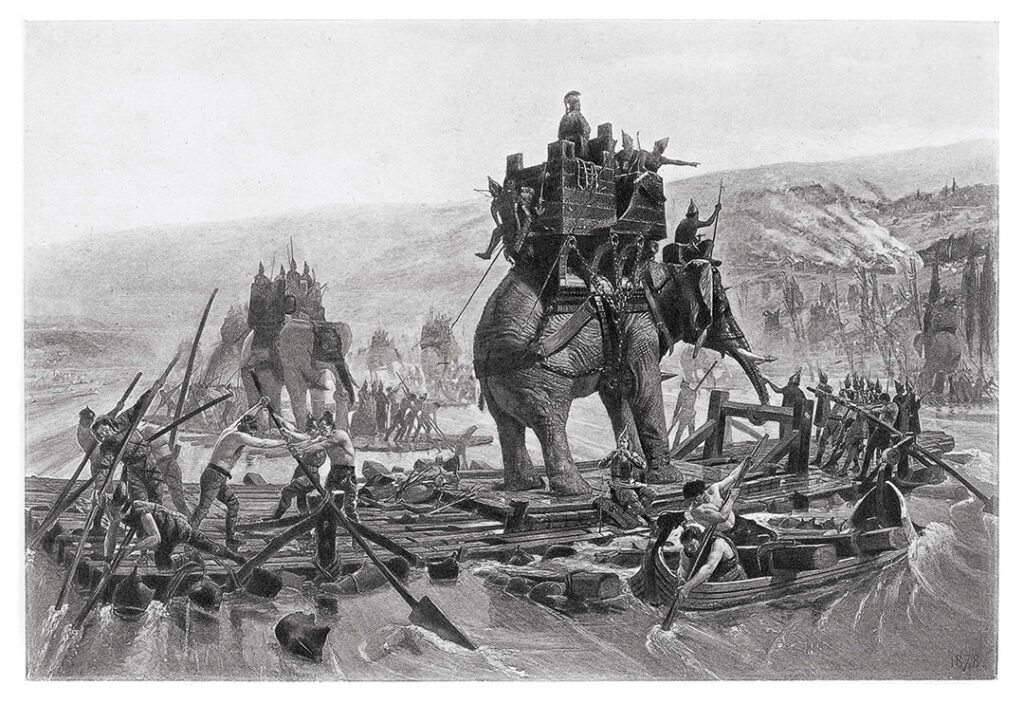ADF STAFF
Nearly 3,000 years have passed since the time of the North African conqueror known simply as Hannibal. Yet he still is remembered as a military genius, a man who used elephants in warfare, and a man who helped shape the course of civilization.
He is best known for the audacity of his greatest military achievement: He took his army over the Alps to invade the region now known as Italy.
Hannibal Barca was born in 247 B.C. in the city of Carthage. Remnants of the city remain to this day in what is now Tunis, the coastal capital of Tunisia. He was born into wealth and power in a city that was the dominant force in the Western Mediterranean. But the region’s military and commercial interests were in conflict with Rome. Hannibal’s father instilled in him a hatred for the Roman Republic that would last his entire life.
The rivalry between the two powers led to the Punic Wars. The first began in 264 B.C. and lasted more than 20 years. Rome was the victor and imposed harsh terms on Carthage that included crippling its navy. After Hannibal’s father was killed in a military campaign, and another officer was assassinated, Carthaginian Soldiers in Spain elected Hannibal as their leader. He went on to conquer Spain, establishing a base for his eventual war against Rome.
In 218 B.C., he began his quest to cross the Alps. The journey required sophisticated logistics and engineering. To get his 37 elephants across waterways, he constructed jetties and floated them on earth-covered rafts. His horses were shipped on large boats or made to swim. The journey from Cartagena, Spain, took five months, and the trek over the Alps took 16 days. In crossing the mountains, his Soldiers faced guerilla attacks, harsh weather and rough terrain. He completed the crossing with 25,000 infantry, 6,000 cavalry and most of his elephants.
His victories at Trebia, Lake Trasimene and Cannae are considered masterpieces of tactical warfare. Time and again he was able to outmaneuver and outthink the Roman generals. Hannibal’s troops savaged the Roman army, killing at least 15,000 Soldiers. Many were driven into the water to drown. He captured an additional 15,000 Romans and allied troops. His troops intercepted and destroyed reinforcements of about 4,000 cavalry.
But he did not invade the city of Rome. Historians theorize that his troops either were too worn out from fighting, or Hannibal believed the city to be too well fortified. There also was the problem of the leaders in Carthage failing to provide him with the reinforcements and resources he needed to continue advancing.
Roman leaders such as Fabius Maximus and Scipio Africanus learned from Hannibal’s tactics and their own mistakes. Maximus avoided direct engagement with Hannibal’s forces, going instead with a war of attrition and strategic strikes against Carthaginian assets elsewhere, including North Africa. Maximus is said to have defeated Hannibal without ever winning a single decisive battle. The turning point came with the Battle of Zama in 202 B.C., where Africanus defeated Hannibal, marking the end of the Second Punic War and securing Rome’s dominance in the Mediterranean. The honorary title of Africanus means “conqueror of Africa.”
After his defeat, Hannibal returned to Carthage, where he became a magistrate and was responsible for economic and military reforms. But he had made enemies at home and abroad, and his distaste for Rome was returned in equal measure. The Romans wanted him as their prisoner.
Seven years after the Battle of Zama, Hannibal fled Carthage into exile. He spent his remaining years as a welcomed guest and military advisor in the courts of Eastern monarchs. In some cases, he was directly involved in warfare against his bitter enemies, the Romans.
The circumstances of his death, about 182 B.C., are unknown. One report states that when he discovered the castle where he was living was surrounded by Roman Soldiers, he poisoned himself. Another account says that his host at the castle poisoned him.
Hannibal is considered one of the greatest military tacticians and generals of antiquity, particularly as a brilliant strategist who could identify his own and his opponents’ strengths and weaknesses.

